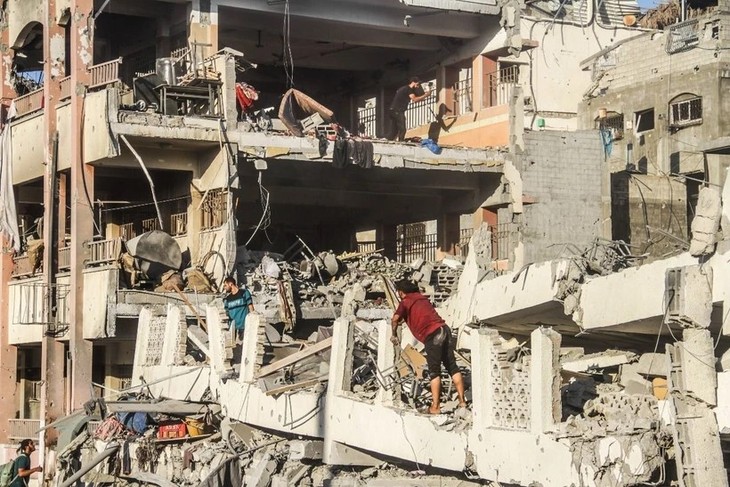(VOVWORLD) - Tension in the Middle East has escalated in recent days with increasing military moves and diplomatic arguments between involved parties, forcing the international community to race against time to defuse a full-blown conflict.
 A school is destroyed after an Israeli airstrike in the Gaza Strip on August 3, 2024. (Photo: Xinhua/VNA) A school is destroyed after an Israeli airstrike in the Gaza Strip on August 3, 2024. (Photo: Xinhua/VNA) |
The US, the UK, France, Germany and Italy on Monday issued a joint statement on the situation in the Middle East, which called on Iran to withdraw its threat of a military attack against Israel. The statement also vowed to support and protect Israel against external attacks.
Imminent risk
British Prime Minister Keir Starmer phoned Iranian President Masoud Pezeshkian on Monday to discuss the situation. According to the British Prime Minister's Office, Mr. Starmer conveyed to the Iranian President the need to de-escalate tension and warned of serious consequences if a full-scale war with Israel breaks out.
US Secretary of Defense Lloyd Austin said Monday that the US has deployed the guided missile submarine USS Georgia and additional aircraft carriers and fighter jets to the Middle East as a warning to anyone intending to attack Israel.
Observers say that rapid diplomatic and military moves in recent days reflect an imminent risk and little time left to defuse it. Western media has quoted Western and Israeli diplomatic sources as saying that Iran's leadership seems to have decided to retaliate against Israel after the assassinations of Hamas political leader Ismail Haniyeh in Tehran on July 31 and a leader of Hezbollah in Lebanon a day earlier, for which Israel admitted responsibility.
Spokesman for the US National Security Council John Kirby told the press on Monday that the US and Israel share the belief that a conflict could break out as soon as this week and they have prepared a response.
"We share the same concerns and expectations that our Israeli counterparts have. With respect to potential timing here, it could be this week. We're continuing to watch it very, very closely, and it is difficult to ascertain at this particular time, what that could look like. But we have to be prepared for what could be a significant set of attacks," said Mr. Kirby.
Observers say diplomatic efforts seem to have failed. Now they’re just trying to minimize the scale of the retaliatory attacks on Israel and restrain Israel’s response to avoid an all-out war.
Ismat Mansour, an expert at the Institute for Palestine Studies, said: "The main goal of the international community now is to prevent escalating tensions and a full-scale war. The biggest danger is that tit-for-tat retaliation could lead to a regional war that would have global impacts and destabilize the Middle East.”
Deadlocked negotiations
The international community is still trying to reach a ceasefire in the Gaza Strip and bring all parties to the negotiating table to find a long-term political solution. Diplomats from the US, Egypt, and Qatar and representatives of Hamas are scheduled to meet on Thursday in Cairo to negotiate a ceasefire and exchange of hostages. The US insisted on holding this meeting and called on Hamas to participate.
Saad Nimr, Professor of Political Science at Birzeit University in the West Bank (Palestine), said Israel’s attacks in the Gaza Strip, southern Lebanon, and Syria, including the airstrike on a school in Gaza on August 10 that killed 100 people, are making diplomatic efforts more difficult.
“Current diplomatic efforts are focused on convincing Iran to minimize its retaliatory attacks against Israel in exchange for Israel agreeing to a ceasefire and exchange of hostages in the Gaza Strip. However, Israel’s recent attacks in the Gaza Strip suggest there will be no agreement,” said Saad Nimr.
Responding to Israel’s attacks, Hamas said Monday that it will not participate in the new negotiations, calling them a cover for the escalation of violence.
Hamas wants to discuss only the three-phase proposal made by President Joe Biden to the UN Security Council on May 31, not other issues. Farhan Haq, the deputy spokesman for the UN Secretary General, said the UN condemns the August 10 attack on a school in Gaza and urges all sides to abide by UNSC Resolution 2735 requesting the release of hostages and an immediate ceasefire in Gaza.